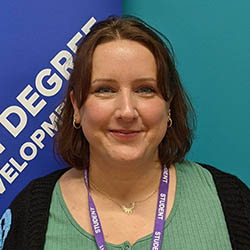Early Years Practitioner (Apprenticeship)
The broad purpose of the occupation is to work and interact directly with children on a day to day basis supporting the planning of and delivery of activities, purposeful play opportunities and educational programmes within the ethos of the setting. An EYP works as part of a professional team ensuring the welfare and care for children under the guidance and supervision of an Early Years Educator, teacher or other suitably qualified professional the Early Years Workforce.
Apprenticeship Standard: ST0888

Elizabeth Lefever
I’ve always wanted to work in the childcare industry and chose this course as the best option to further my career. I like the fact that I have work placements in nurseries and schools to get more experience and become more confident. The support staff and teachers are happy to help and full of encouragement.
Child Care

Laura Pearce
As a teaching assistant, I find the course extremely relevant to my job. The course has taught me a lot about children’s learning development, and I’m applying what I’ve learnt so far within my role at the school where I work. Studying for a degree in Newbury is an advantage to me. I was thrilled that UCN’s partnership with the University of Reading made this possible for me. More...
Foundation Degree in Children's Development and Learning
-
Description
This occupation is found in a range of private and public settings including; full day care, children's centres, pre-schools, reception classes, playgroups, nursery schools, home based provision, hospitals, social care settings, out of school environments and local authority provision to deliver the Early Years Foundation Stage (EYFS) requirements set by government for the learning, development and care of children from birth to 5 in both indoor and outdoor environments.
In their daily work, an employee in this occupation interacts with parents, children, colleagues and wider multi agency professionals and partners such as health visitors, social workers and speech and language therapists. Individuals will undergo all checks as per the EYFS requirements to ensure suitability to work with children. Due to the nature and level of responsibility it is not anticipated that the role would have any budgetary or leadership responsibilities.
They will be responsible for supporting child initiated and adult led activities based around the needs and interests of each individual child, supporting children's learning through planned, purposeful play opportunities and educational programmes and working as part of a team to ensure each child feels safe and secure. An EYP will also support the observation and assessment of each child and contribute to their learning experiences and assist with the care needs of the individual child such as teeth, skin, hair, feeding, changing nappies and toileting under direction of a more senior member of the team. They will also work in partnerships with other colleagues, parents and/or carers or other professionals, with support from a more senior member of the team, to meet the individual needs of each child. They will also have a responsibility for ensuring that they recognise when a child is in danger and/or at risk of serious harm or abuse and contributing to the health and safety of the children, staff and others on the premises.
Typical job titles include:
- Assistant childminder
- Early years practitioner
- Nanny and early years worker
- Nursery assistant
- Nursery nurse
- Nursery practitioner
An apprenticeship is a genuine job and under all circumstances an apprentice will be employed from day one. Apprenticeships combine practical training in a job with study.
-
Entry Requirements
Apprenticeships are available to anyone over the age of 16, living in England and have no upper age limit. Any vacancies will clearly state what the entry requirements are for the job role being advertised. There will be different entry requirements depending on the company and role.
A minimum 5 GCSEs at grade 3/D or above, including maths and English are recommended for this apprenticeship. Individuals without level 1 English and maths will need to achieve this level and take the test for level 2 English and maths prior to taking the end-point assessment.
Applicants will need to undertake an Enhanced Disclosure and Barring Service (DBS) process and provide the result prior to starting.
Candidates should have a willingness to learn independently and apply learning in their current workplace. Access to a computer and basic IT skills are essential to complete assignments and other elements of the programme.
-
Qualification
Apprenticeship Standard: ST0888 Early Years Practitioner Cache Level 2 Early Years Practicioner
-
Progression
This apprenticeship provides an ideal entry into the occupation and supports progression within the sector. Additionally, there is the option to progress on a Level 3 qualification.
-
Assessment
Through their apprenticeship, apprentices gain the technical knowledge, practical experience and wider skills they need for their job and career. Apprentices will have their skills, knowledge and behaviours evaluated at the end of their apprenticeship by taking an end-point assessment (EPA). This is known as synoptic assessment. Individuals without level 1 English and maths will need to achieve this level and take the test for level 2 English and maths prior to taking the end-point assessment.
-
Home Study
The apprentice is expected to study through a mix of learning in the workplace, formal off-the-job training and the opportunity to practise new skills in a real work environment. The time spent on off-the-job training should be at least 20% and should be included as part of working hours. The employer must allow time to complete the apprenticeship within the working hours, however, some homework may be set by College Tutors or Development Coaches.
-
Work Placement
This is a work-based programme and is studied as part of an apprenticeship.
-
Fees and Additional Costs
If you are between the ages of 16 and 24, you will not have to fund your own tuition, it is your employer and the government who cover the fees. If you are over 25, you may be asked to contribute towards the cost of your training, but it depends on your employer. If you do have to contribute to the cost of training, you may be eligible for an Advanced Learner Loan.
| Code | Start | End |
|---|---|---|
| AP/2EYP/S 232501 | Flexible Start |
* Terms and conditions apply. The fees stated on this website are for guidance purposes only and should be checked before enrolment. Unless otherwise stated, fees shown are for tuition only, over one academic year. Where a course is longer than one academic year, the fees stated are for the first year, and the cost of the second or subsequent years will be discussed at interview. For details of fee remission for students over 19 click here. If you think you may be entitled to a concession or fee remission, or you would like more information on the additional costs associated with your chosen course, please contact us on 01635 845000 or email This email address is being protected from spambots. You need JavaScript enabled to view it..
